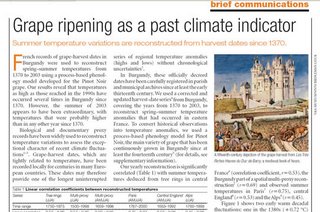More on global warming
 I've been thinking more about global warming. Some thoughts:
I've been thinking more about global warming. Some thoughts:The data do seem to suggest that there has been a rise in temperatures in wine regions over the last 50 years. That much is uncontroversial.
There's also the survey by French researcher Isabelle Chiune and here colleagues that was published in Nature in 2004. They used historical records of the grape-harvest dates in Burgundy to reconstruct spring–summer temperatures from 1370 to 2003. They found two particularly warm decades, in the 1380s and 1420s, followed by a series of warm decades in the 1520s, 1630s and 1680s. After this a long cooling phase began, which commenced with a cold snap in the 1750s, lasting until the 1970s.
Winemakers I have polled on the topic share a common concern about the impact of climate change.
‘I think there is no question about global warming,’ says Michael Moosbrugger of Schloss Gobelsburg in Austria’s Langenlois. ‘We see it in our documentation about the flowering dates of the past decades. If we take the average, then we can recognize the warming effect. On the other hand, we still have cool (1996, 2001, 2004) medium (1998, 1999, 2002, 2005) and hot years (1997, 2000, 2003).’ Moosbrugger adds that, ‘The prospect is that in the future we will see more warm years then cool years. So how do we react on that? At the moment not at all. I guess one effect would be that in generall we would slowly become a red wine growing area, for which we would be prepared as we already are growing Pinot and St. Laurent. For vine managment we have to be flexible anyway, as we have to react on the situation of every vintage individually. For the future it also means that we will also look for vineyards that are cooler and higher located in the hills.’
'Climate change is strongly factored in all I am planning’, says Australian wine scientist and winemaker Brian Croser. ‘From Tapanappa’s view point I have a rule, which is not further than 30 km from the coast, not lower than 300 m and not less than 900 mm of annual rainfall.’
‘I’ve been concerned about climate change for more than 20 years,’ says Clare Valley vigneron Jeffrey Grosset, ‘and Gaia Vineyard stands as a somewhat meagre initiative to not only offset the impact temporarily, but was also established from a personal wish that it could, in some small way, raise people’s awareness of the sensitivity of grape quality to the most subtle changes in climate, as is the case with most living things.’ Grosset adds that. ‘The loss of species on earth is of course just making this all so much worse, and the description “self mutilation” best sums up the impact on us, and other living things.’
‘I am a true believer’, said New Zealand winemaker Steve Smith when I asked him about global warming. ‘It will have a significant effect on us and on winegrowing around the world, the only issue is when and by how much.’ Smith adds that, ‘Whether we are experiencing the effects of it now is debatable. However, in my view the weather patterns seem to be more dramatic. Ironically it seems that frost is playing a bigger part with the warmer early spring pushing earlier bud burst yet we are still exposed to the polar fronts that come through and dump late snow and therefore increase frost risk on buds that have burst quite early.’ For various reasons Smith feels that New Zealand will suffer less from the effects of global warming than many other regions, chiefly because it has plenty of room to move south to cooler areas, and because rises in temperature may well make viticulture easier in established regions.
As well as changing temperatures, though, we may have increased frequency of dramatic or unpredictable weather events. This would make viticulture much more risky.
It has taken a long time for winegrowers to work out which grapes grow best where - a prerequisite for fine wine production. It's not always easy to work this out theoretically.
If there is a human contribution to global warming, then we owe it to our children (perhaps even ourselves) to take the financial it that comes with dealing with it. In fact, the only justification for doing nothing is if we are sure that the well documented trends of warming are not a result of human activity, but merely reflect a natural cycle. If we don't act, there is at least a chance of catastrophe, and for any commentators to deliberately argue a political line against global warming not based on good evidence, either through unconscious confirmation bias or financial motivations is, in my book, a grave evil. Even if you are a sceptic, it must be better to err on the side of caution.
Labels: global warming
 The web log of wine journalist Jamie Goode. Feel free to nose around; your comments are welcome
The web log of wine journalist Jamie Goode. Feel free to nose around; your comments are welcome 
